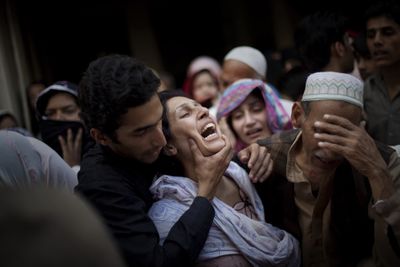Taliban leader threatens U.S. attacks
Warnings are apparent response to drone strikes

PESHAWAR, Pakistan – Baitullah Mehsud, the leader of Pakistan’s Taliban movement, threatened Tuesday to launch attacks inside the United States in retaliation for missile strikes by American drones aimed at militant leaders sheltering in Pakistan’s tribal areas.
In an unusual step, the normally reclusive Mehsud made a round of calls to media representatives claiming responsibility for a commando-style strike on a police training school near the eastern city of Lahore a day earlier. In those calls, he also threatened to widen his campaign of attacks.
“Our mission is to continue jihad in Afghanistan and Pakistan and to avenge drone attacks, even inside America,” he told a representative of the Los Angeles Times. Asked about a $5 million American bounty on his head, he replied: “Martyrdom is our aim, and we would be very happy if we could achieve it.”
U.S. and Pakistani intelligence officials have said that Mehsud and his organization, thought to have links to al-Qaida, are under increasing pressure as a result of American missile strikes in Pakistan’s tribal areas, which have escalated over the past six months. Several recent raids have taken place in Mehsud’s stronghold, in South Waziristan, and have killed some of his close associates.
Mehsud is blamed by the Pakistani government for dozens of suicide bombings and other attacks inside the country, including the December 2007 assassination of former Prime Minister Benazir Bhutto. He has denied responsibility for Bhutto’s killing.
Although Mehsud’s campaign of violence is aimed primarily at the Pakistani government, some fighters loyal to him have crossed over into Afghanistan for attacks against Western troops battling an insurgency there. But analysts say there has been no indication that he has the ability to extend his reach outside the region, although he has threatened such strikes.
In Washington, Pentagon officials said they could not determine how serious or imminent Mehsud’s threats were. But they emphasized that they keep a close watch on the group and treat it seriously.
“He’s a bad guy,” said a military officer, discussing the internal assessments on condition of anonymity. “He, his activities and his group remain a threat. And this is an indication of how dangerous he and his group is.”